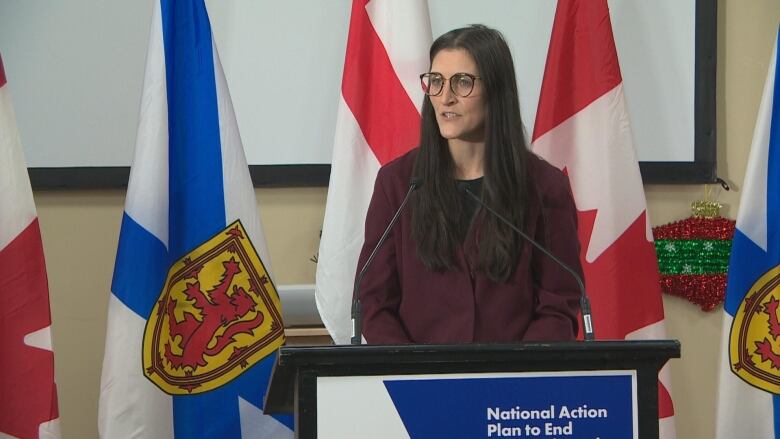Federal government providing $18.3 million to N.S. for gender-based violence plan
Province signed on to the National Action Plan to End Gender-Based Violence in November 2022

The provinceand federal government announced afunding agreement on Thursday aimed at supporting the implementation of the National Action Plan to End Gender-Based Violence in Nova Scotiaa plan the province signed on toin November 2022.
The funding of $18.3 million over four years is part of the 2022 budget earmarked for provinces and territories to implement theplan, which can fund the work of community groups.
"Community organizations are the experts," said Jill Balser, the Nova Scotia minister responsible for the Advisory Council on the Status of Women, during a news conference."We are committed to working with all the community organizations to advance their efforts to prevent gender-based violence and better support survivors."
The Peer Outreach Support Services and Education (POSSE) Project is one organization being funded and will receive$1millionover fouryears. The group trains youth in Sackville, Sipekne'katik First Nationand Windsor-West Hants to be peer support outreach workerswho can assist and educate otherson issues like sexualized violence and human trafficking.
In an interview, director and co-founder of the POSSE Project,Kimm Kent, said the funding is "ground-breaking" and will help provide the organization with stability.
"Normally projects like ours started with just one year project-based funding," Kent said. "So it was always really difficult, especially when you're building relationships with marginalized populations where trust is required ... wondering if you'd have the door open for the next year."

Meanwhile, the Mi'kmawNative Friendship Centre will receive $725,000 over four years. Executive directorPam Glode-Desrocherssaid the money could help the organization extend its support service hours.
"When there's an emergency, it's never Monday to Friday at 9to 4, it's ... when the doors are closed for everybody," said Glode-Desrochers in an interview.
She said the funding could also help the organization address human trafficking something the centre has been facing "a lot" lately and provide safe spaces for people experiencing gender-based violence.

This money comes after the Mass Casualty Commission issued its final report in March, and more than fouryears since the inquiry into Missing and Murdered Indigenous Women and Girls issued its calls for justice.
Lawyer Jessica Zita,who represented the Portapiquegunman's common law spouse Lisa Banfield during a public inquiry into his April 2020shooting rampage that left 22 dead,said the announcement is a "step in the right direction."
"I think the last couple of years have showed us that collectively we're not where we should be in terms of understanding these issues," Zita told CBC News.
The inquiry found the gunman had a history of violence against Banfield. While Banfieldsurvived the 2020 attack, she waslater charged with providing him ammunition. The case against her was eventually resolved.
Zita says the National Action Plan is promising, but Banfield was a victim of coercive control and she would like to see more in the plan to address that.
"It's insidious, it hides it. It's like ...it's a wolf in sheep's clothing. And I think some some very public examples we've seen in the last couple of years have shown thatwe are not where we need to be in terms of recognizing or understanding the signs of what coercive control can look like," Zita said.
With files from Kayla Hounsell












_(720p).jpg)


 OFFICIAL HD MUSIC VIDEO.jpg)
.jpg)



























































































